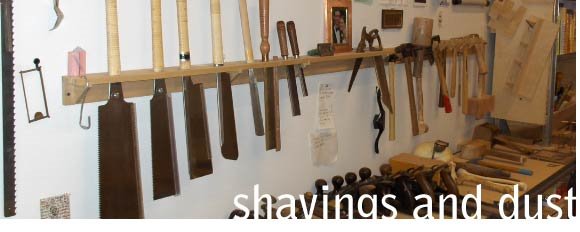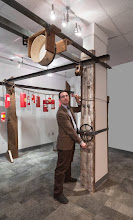In 1987 I was taking an after school acting class at out local community theater, and they told us that some extras were needed for the mainstage play that was going on, which was "My Fair Lady." So I played a street urchin at the age of 14, and during the show I looked around and saw these people wearing all black (cool) with flashlights and tools and stuff (very cool) and hanging out with cultivated bored-but-superior looks on their faces smoking cigarettes outside the heavy green loading doors at the back of the theater (holy crap so very cool omigod omigod). I volunteered to be on the running crew, and to help build sets, and it changed my life.
Looking back, it is obvious to me now that I was at the beginning of exploring the line between the workers and the worked-for, somehow identifying with the people who do "real work" (not that I really knew what that meant, then or now) and the people who don't. And I wanted (and still want) to be on the side of the line where people are working. Even at parties, I tend to help clear dishes or play guitar, providing entertainment. When stressed, I find I have to do something with my hands, to tidy the room, or do dishes or make something. To relax I make things: songs or objects or occasions. My hobbies have often involved being on the "provider" side of the equation, most recently volunteering on a traditionally rigged tall ship as crew, instead of wanting to go aboard as a passenger.
This is not going to be a post about my relationship with the entertainment industry, however. There are things there that I do want to write about at some point, but suffice it to say that in 2006, nineteen years after I fell in love with live theater, I filed for divorce. I had been starting to form some ideas about objects and how I wanted to make them, and about my (very complicated, like everyone else's) relationship with them, and it became clear that theater was not what I wanted to be doing. There were other factors of course. I had also fallen out of love with New York City and was growing to resent it more and more.
So I turned away. I turned and walked away from eighteen years of a career and a way of thinking and a vocabulary and a set of norms, and decided to try something else entirely. It was not easy, initially. I had been in the entertainment industry longer than I had been out of it. I had never really had a job that was not somehow connected with it. All of my ideas about how to live and how to think and what to expect professionally and personally had been shaped by entertainment. Over the last three and a half years I have been navigating a new way of thinking, a new set of expectations. I have learned a lot, and am generally happier now than I was from about 2002 to about 2006, for a lot of reasons, both personal and professional.
Theaters, all of them, have a particular smell. No matter where you go, there is a "theater smell," the smell years of paint and lumber and super heated lights and sweat and laughter and tears. It is a smell of flame-retardant salts and tension, of several hundred people in a room experiencing a single moment all together. Maybe it is a vibe instead of a smell. It is unmistakable, though, and I bet if I were blindfolded and led into a theater I would be able to tell immediately. It is a smell that hit me in the center of the chest today, and for a moment made it hard to breathe.
Then I fell in to the comfort of jargon and conversation, of discussing methodologies and techniques and power structures. It felt strangely calming, like stepping off the deck of a storm-tossed ship on to the dock in my home port. I had just met Don but I actually knew him a great deal better than I know some of the colleagues I have been teaching with or near for the last two semesters. All of my shibboleths applied here, all of my assumptions held true.
It was an arresting experience.
Walking through the theaters and shops conversations started, conversations about integrating design work, about sustainable initiatives in the entertainment world, about the possibilities of making more responsible choices in the entertainment industry and in the design industry.
I do not think I want to return to the entertainment industry. I do not think I have an interest in being a set designer again. But maybe my new path includes working with some members of that industry to find ways of doing what they do in a cleaner, healthier way. Many of the lessons I learned in my former life have given my life a heading over the last few years, how interesting to think that this new way of thinking might turn around and help set bearings for my former colleagues.

